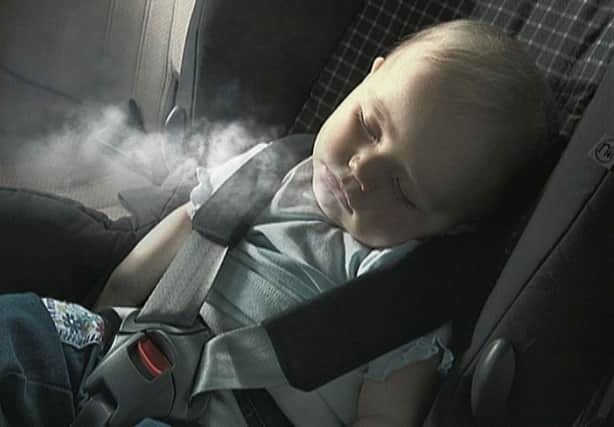Leaders: Stopping smoking in cars not beyond police


It is difficult to imagine smoking in the workplace, 20 years on from when the practice started to become taboo. Subsequent legislation then banned smoking in enclosed public places, a measure which overcame a modest amount of resistance and now seems “normal”. Attitudes have changed, and anyone lighting up in the wrong place is not tolerated.
But while legislation banning smoking in cars carrying children has obvious health benefits, it is criticised for failing one of the basic tests of a law’s suitability: practical enforcement. Opponents argue that it will not be possible to monitor and punish those who break the law, and yesterday Police Scotland warned that the workload involved could not be justified.
Advertisement
Hide AdAdvertisement
Hide AdIt has to be acknowledged that there is a clear issue over how the law is implemented. The ban on smoking in public places is enforced by environmental health officers, whereas the ban on smoking in cars will be the remit of Police Scotland.
In a submission to the Health Committee at Holyrood, it is argued by the force, with merit, that road policing officers are employed to reduce road casualties and tackle road crime, and that chasing smokers would be an unwelcome distraction – although this point was over-stated with a claim that new legislation would undermine the fight against terrorism. This is an unconvincing argument which, by extension, means no new laws can be accommodated in Scotland without compromising national security.
The reality is, however, that if we do not want children to be subject to the effects of in-car smoking, Police Scotland has a role to play. It will not be possible to stop and punish every offender, in the same way that only a fraction of speeding drivers can be brought to justice. But officers are vigilant on seatbelt legislation and there are regular crackdowns on the use of mobile phones while driving. This does not mean the formation of a flying squad is required for in-car smoking; heightened vigilance during existing policing duties would be sufficient.
Education is also important, but the key is to create an effective deterrent through the threat of punishment, and where a vehicle is involved, only the police have the ability to pursue offenders successfully.
The police can hardly be blamed for taking a stance at a time when serious cuts have had to be made across the force. Putting a stop to smoking in cars is clearly not among Police Scotland’s own identified priorities, but neither is it beyond the force’s capability.
Magna Carta can’t settle human rights row
IT is one of those odd, but not unusual, quirks of timing that the 800th anniversary of the Magna Carta, which is said to have laid the foundations for modern democracy, coincides with a controversial attempt to replace the Human Rights Act with a British bill of rights.
David Cameron claims that the rights the Act is supposed to protect have been distorted in recent years, and says the 800th anniversary of the Magna Carta is an appropriate time to “restore the reputation” of human rights. Opponents have accused the Prime Minister of blatant opportunism, hijacking a historic moment for political gain.
It would have been preferable if these two events had arrived at different moments, and Mr Cameron’s remarks had not been so loaded, although it is difficult to see how a politician could let the moment pass without attempting to link the past to the present.
Advertisement
Hide AdAdvertisement
Hide AdBoth sides of the human rights debate believe they can make a legitimate claim on the Magna Carta to underpin their case. After eight centuries, it is possible to interpret its original principles and enduring legacy in a number of ways which can back either the retention or the replacement of the Human Rights Act, depending on who is the most persuasive.
But 800 years on, it is stretching a point to say that an act or a bill will honour or betray the Magna Carta. Its key principles, that no man is above the law, and “to none will we sell, to none will we deny, or delay, the right of justice” have not been lost sight of. The anniversary has brought the debate back into focus, but the issues we face on human rights will not be settled by a history lesson.